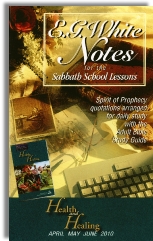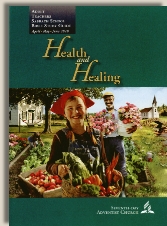|
||||||||||||||
Commentary on "Nutrition in the Bible"
Day 3: Monday, June 14, 2010 - The Post-Flood Diet
Overview
On the topic of diet, the Genesis account passes over the era of the sin-filled antediluvian world, so we will now look at the post-flood diet prescribed by God and examine what he said to Noah when he exited the Arc.
Every moving thing that lives shall be food for you. And as I gave you the green plants, I give you everything. But you shall not eat flesh with its life, that is, its blood. (Gen. 9:3-4 ESV)
Observations
While Gen. 8:20, along with several other passages, makes it clear that the concept of ‘clean and unclean’ animals was understood by Noah, God, in Gen. 9:3-4, makes no diet restrictions relative to what is clean or unclean. Rather, God specifically states that “every moving thing that lives” shall be food. The one requirement is that mankind is not to eat meat with the blood in it. Not until we examine the dietary laws of the Hebrew people do we learn the meaning of ‘clean and unclean’ flesh.
In today’s lesson we find this statement: ‘Only after the Flood, with so much vegetation destroyed, did God give humans permission to eat animals’.
In the immediate aftermath of the flood, there were only eight people who needed to eat to sustain life, while there were thousands of animals who would have been dependent upon plant foods for survival. There could have been no critical shortage of plant life or our animal world would have starved to death.
God does not explain what his reasons may have been for allowing mankind to eat all living things. Not only does the bible make no such statement, it is not logical to assume a shortage of vegetation was the motive for what God said. For, if the animals they were now allowed to eat were to survive they also needed access to this vegetation. It is well known that is takes much more food to support an animal you plan on eating than to simply eat the original food source.
In the teacher’s comments there is this statement: "Eating a healthy diet promotes health and a solid relationship with God."
Since there are no biblical references provided in the lesson to support the theory that a healthy diet promotes a solid relationship with God, we should look at this passage that counters this claim:
And he called the people to him and said to them, "Hear and understand: it is not what goes into the mouth that defiles a person, but what comes out of the mouth; this defiles a person." Then the disciples came and said to him, "Do you know that the Pharisees were offended when they heard this saying?" He answered, "Every plant that my heavenly Father has not planted will be rooted up. Let them alone; they are blind guides. And if the blind lead the blind, both will fall into a pit." But Peter said to him, "Explain the parable to us." And he said, "Are you also still without understanding? Do you not see that whatever goes into the mouth passes into the stomach and is expelled? But what comes out of the mouth proceeds from the heart, and this defiles a person. For out of the heart come evil thoughts, murder, adultery, sexual immorality, theft, false witness, slander. These are what defile a person. But to eat with unwashed hands does not defile anyone." (Matt. 15:10-20 ESV)
In this passage Jesus is confronting the concept that what we eat has some kind of spiritual merit. Only the things that come out of the mouth and from the heart can defile a person. Jesus then goes on to give examples of what he means by this. These are the kinds of things that concern God and are what would affect our relationship with him. The food we eat, good or bad or how we eat it, is unrelated to our relationship to our God.
One vitally important point that needs to be heeded is that Jesus does go on to say that those who make such claims are “the blind lead the blind, both will fall into a pit”.
Summary
- True, mankind was aware of the concept of clean and unclean animals at least as far back as the time of Noah. However, not until God makes a covenant with the Hebrew people shortly upon their departure from Egypt, Lev. 20:22-26, does God provide both a purpose and an explanation of what this means. Tomorrow we will take another look at the meaning of this passage and compare it with Peter’s vision found in Acts chapter ten.
- God does not explain himself when he declares to Noah that all living things are food for mankind. To claim there was a shortage of vegetation is nonsense because the animal population we were now to include in our diet would have starved to death with this assumed shortage of vegetation.
- Passages such as Matt. 15:10-20 make it abundantly clear that any health message, however important it may be for maintaining good health, is unrelated to our spiritual relationship with God. This is false teaching that makes the gospel message a 'none gospel', Gal. 1:6-9. Those who believe and teach such things are the blind leading the blind into the pit of destruction.
Copyright 2010 BibleStudiesForAdventists.com. All rights reserved. Revised May 17, 2010. This website is published by Life Assurance Ministries, Glendale, Arizona, USA, the publisher of Proclamation! Magazine. Contact email: BibleStudiesForAdventists@gmail.com.
The Sabbath School Bible Study Guide and the corresponding E.G. White Notes are published by Pacific Press Publishing Association, which is owned and operated by the Seventh-day Adventist church. The current quarter's editions are pictured above.
Official Adventist Resources
Standard Edition Study Guide Week 12
Teacher's Edition Study Guide Week 12
Easy Reading Edition Study Guide Wk 12
Search the Complete Published Ellen G. White Writings


